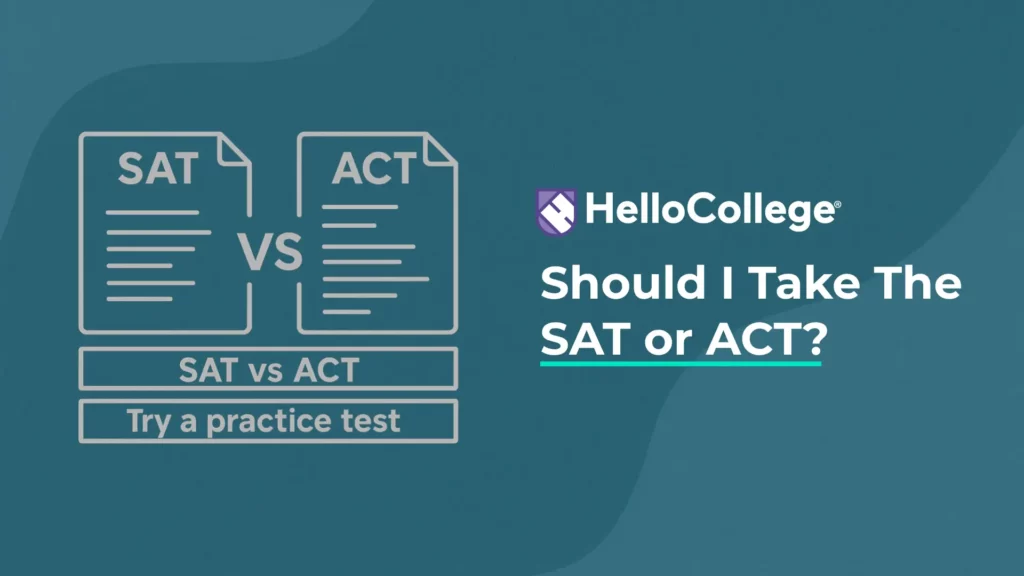
Deciding “should I take the SAT or ACT?” is a common dilemma for high school students navigating the college admissions process. Both tests are important, but they differ significantly in format, content, and timing, which can impact your performance and readiness for college. In this post, we’ll help you decide between taking the SAT or ACT, highlight the advantages of each, and offer guidance to help you determine which test aligns best with your skills and strengths.
Should I Take the SAT or the ACT?
Step 1: In order to decide SAT or ACT, you should begin by learning the ins and outs of the tests themselves. What subjects does the SAT cover? What about the ACT? How many questions are on the ACT, and how fast do you have to work to answer them? What level of math is on the SAT? How does SAT reading differ from ACT reading? And so on.
Step 2: Once you have a good understanding of the tests, it is time to reflect on yourself. What kind of test-taker are you? What are your strengths and weaknesses? How well do your strengths and weaknesses fit in with the SAT or ACT?
Step 3: After you have an idea of which test might be the right fit for you, try your hand at some questions, or take an SAT or ACT practice test.
SAT Overview
Before you make your decision between taking the SAT or ACT, it’s important to understand the test format and the main objectives of each test section.
SAT Fast Facts
- The SAT is administered by the College Board, a not-for-profit educational institution that was founded in 1899.
- The SAT test is fully digital. Students take the test on a computer or tablet provided by the test center OR on the student’s personal computer or tablet that they bring to the test center.
- The test lasts 2 hours and 14 minutes and includes 98 questions total. You also get a 10 minute break in the middle.
- The test covers two subjects: math and reading/writing.
- The test is scored on a scale of 400–1600. This total score is calculated by adding your math score and your reading/writing score together, both of which are scored on a scale of 200–800.
- The test is broken down into 4 modules. The first two modules cover reading and writing, while the second two modules cover math.
- Each reading/writing module is 27 questions long and takes 32 minutes. This means you have about 1 minute and 11 seconds per question on average.
- Each math module is 22 questions long and takes 35 minutes. This means you have about 1 minute and 35 seconds per question on average.
- Most questions are multiple choice, except for a handful of math questions that will ask you to enter a numerical answer.
- The test is adaptive. Students who score well on the first module (roughly 75% or better) for each subject will be given a harder second module. Others will be given an easier second module. Students who don’t make it to the harder module will have their score capped around 650. That means getting the easy module in both sessions would cap your score at around 1300/1600.
- Students will have access to DESMOS. Students are also allowed to bring their own scientific calculator or graphing calculator. Calculators are allowed on all math questions.
SAT Reading and Writing Sections
- There are 7 question types on reading/writing modules. They always appear in the order listed below (all vocab in context questions come first, then all main idea questions, and so on). The number of questions in each category varies from test to test, but Standard English Convention questions tend to make up about 25% of this section, typically including 7 or more questions.
- Vocab in Context. These questions will test your knowledge of vocabulary and word usage in the context of a short passage. Example: Which choice completes the text with the most logical and precise word or phrase?
- Main Idea. These questions will ask you the main idea of a passage as a whole. or will ask what the main idea of a sentence is in the context of a broader passage. Example: Which choice best describes the function of the second sentence in the overall structure of the text.
- Supporting/Weakening Claims. These questions ask you to choose a piece of evidence that either supports or weakens a conclusion given in the passage. Example: Which choice best describes data from the graph that weaken the student’s conclusion?
- Logical Completion. These questions ask you to choose a sentence or phrase that best completes the passage. Example: Which choice most logically completes the text?
- Standard English Conventions. These questions ask you to answer questions about grammar and punctuation. Example: Which choice completes the text so that it conforms to the conventions of standard English?
- Transitions. These questions ask you to choose the best logical transition word to insert between two sentences. Example: Which choice completes the text with the best logical transition?
- Using Notes. These questions provide a passage and a set of student notes about the passage. They ask you to decide which notes are most relevant to a specific purpose. Example: The student wants to emphasize a difference in the origins of the two words. Which choice most effectively uses relevant information from the notes to accomplish this goal?
SAT Math Section
- The SAT mostly tests math content from Algebra I, Geometry, and Algebra II. It also includes a little bit of Trigonometry content.
- Some of the most heavily tested concepts include: linear equations, quadratic equations, exponential equations, word problems, systems of equations, statistics (mean, median, mode), and geometry of lines, triangles, and quadrilaterals.
- The harder questions on the SAT math are exercises in problem solving. They are designed to test your deeper understanding of math concepts rather than your ability to memorize steps for solving problems.

ACT Overview
The ACT differs from the SAT in several key ways that are worth considering as you make your decision.
Fast Facts
- The ACT is administered by ACT, Inc., a company that was founded in 1959.
- The ACT is a paper test, but some testing centers offer an optional digital format. Both formats are currently the same.
- The test gives you 2 hours and 55 minutes to complete 215 questions. You also get a 15 minute break in the middle.
- The test covers four subjects: English, math, reading, and science.
- The test is scored on a scale of 1-36. This score is calculated by averaging your score in each of the four subjects and rounding to the nearest whole number.
- The English test is 75 questions long and takes 45 minutes. This means you have 36 seconds per question on average.
- The math test is 60 questions long and takes 60 minutes. This means you have 1 minute per question on average.
- The reading and science tests are both 40 questions long and take 35 minutes. This means you have about 1 minute and 8 seconds per question on average.
- All Questions are Multiple Choice.
- All questions are scored with equal weight. The test is also graded on a curve, so on a harder test you are allowed to miss more questions while finishing with the same score.
ACT English Section
- The English section is formatted into 4 passages, and it asks multiple choice questions about edits to the passages.
- Most of the questions are about grammar and punctuation edits. Some will require you to remove redundancies and make the writing more concise.
- Other questions are logical choice questions. Some ask you to reorder sentences or paragraphs to improve the logical flow of the passage. Others ask you whether or not the passage accomplishes a specific purpose.
ACT Math Section
- The math section covers Algebra 2 material, as well as trigonometry and some precalculus.
- The earlier questions on the math section tend to be easier while the later questions tend to be harder.
- There are several math concepts tested on the ACT that are not on the SAT. These include equations of circles, ellipses, and hyperbolas; the law of sines and cosines; basic trigonometric identities; matrices; and more advanced probability.
ACT Reading Test
- The reading test contains 4 longer reading passages and 10 questions per passage testing your reading comprehension. Each passage is about 800 words long (equivalent to 2.5 double spaced pages).
- Some questions are about specific sentences or paragraphs. Others are about the passage as a whole.
- Some questions test vocabulary. They ask about the specific meaning of a word as it appears in the passage.
- The test always includes the same types of passages: The first passage is always a literature passage, the second is always a social sciences passage, the third is always a humanities passage, while the fourth is always a natural science passage.
- One of the passages will always be a comparison between two different pieces of writing that both address a similar topic.
ACT Science Test
- The science test contains 6 passages. These usually describe an experiment and provide 2–3 graphs or tables of data with the results.
- The number of questions on each particular passage varies.
- Most questions ask you to extrapolate data from the passage. The section generally does not test your scientific knowledge but rather tests your ability to interpret data.
- 1–3 questions on the section typically require some outside scientific knowledge. These are fairly straightforward conceptual questions that are covered in basic high school biology, chemistry, and physics courses.
SAT or ACT: Self-Reflection

Choosing between the SAT or ACT largely depends on your personal strengths and abilities. Asking yourself the following questions will help you select the test that best showcases your abilities and sets you up for success.
| Are you a slower test-taker? | If you are a slower test taker, favor the SAT. The ACT only gives you about 49 seconds per question on average, whereas the SAT gives you about 1 minute and 22 seconds per question. | |
| Are you prone to careless mistakes? | If you tend to make careless mistakes, the ACT might be a better option. Because it has more questions, the ACT is more forgiving of one or two accidental mishaps. Additionally, (unlike the ACT) missing an easy question on the SAT is penalized harder than missing a difficult question, so a small mistake on an easy SAT question can have a bigger impact on your score. | |
| Are you great at math? | Since the SAT only covers two subjects, your math performance makes up 50% of your score. If you are less confident in math, you might want to consider the ACT since math only makes up 25% of your final ACT score. | |
| Have you taken Trig and precalc? Are you confident working with the material? | The ACT covers some more advanced trigonometry and precalculus questions, whereas the SAT does not. If you are comfortable with trig and precalc, the ACT math should not be a problem for you. If you aren’t, you should develop a plan to learn those concepts, or you might consider taking the SAT instead. | |
| Are you great at interpreting graphs, tables, and data? | The entire ACT science section tests your data interpretation skills, and that translates to 25% of your score. The SAT, by contrast, includes a few questions on the Reading and Writing modules that include data, but these questions are comparatively minimal. | |
| Are you comfortable reading and digesting long, dense reading passages? | The ACT requires you to read long passages (about 800 words) and answer several questions about each one. The SAT, by contrast, gives your shorter passages, and there is only one question per passage. | |
| Do you like writing directly on your test? | The ACT is still a paper test, which means you can write directly on it. Some students prefer this to the digital SAT test. (The SAT still gives you digital tools for highlighting text). | |
| Do you have experience using DESMOS? Do you find it useful? | DESMOS can be a very powerful tool, and it is available on both SAT math modules in their entirety. If you are comfortable using DESMOS, this could be a reason to take the SAT. Additionally, you are allowed a standard graphing calculator or scientific calculator on both the SAT and the ACT. | |
Try Some Test Questions!
You’ll never know for sure which exam is the best fit until you’ve experienced the real thing. If you’re asking, should I take the ACT or SAT? try your hand at some real test questions:
- The College Board provides students with 6 free practice tests in the Bluebook testing app. You can find instructions for downloading the Bluebook app and accessing the practice tests here.
- The ACT provides students with one free ACT practice test on their website.
- For additional practice tests and to work one-on-one with a tutor, schedule a free consultation to learn more about the SAT/ACT tutoring at HelloCollege.
Conclusion
Ultimately, the choice between the SAT or ACT should reflect your personal strengths and testing preferences. Taking practice tests for both the SAT and ACT can provide valuable insight into which exam suits you best. Whichever path you choose, remember that thorough preparation and a positive mindset are key to achieving your college admissions goals.








